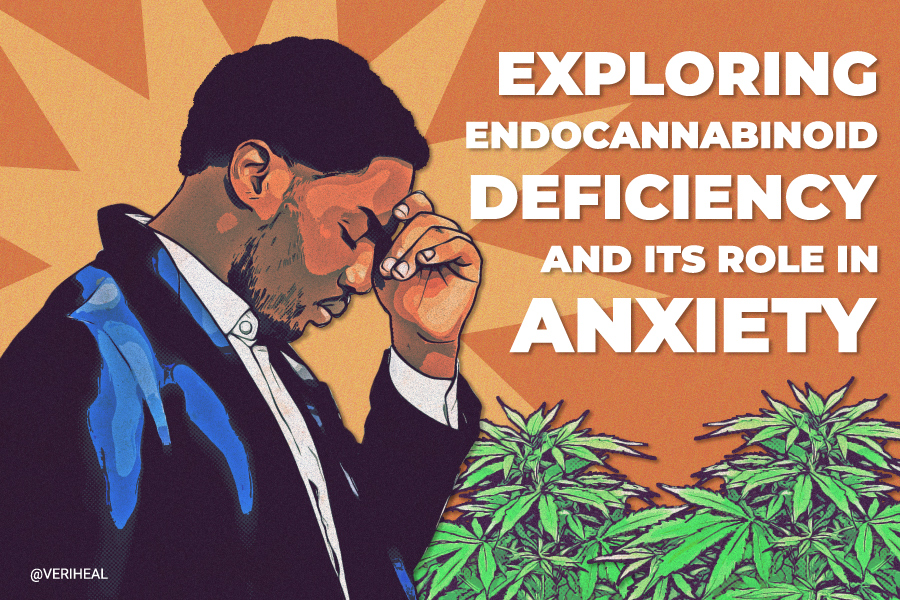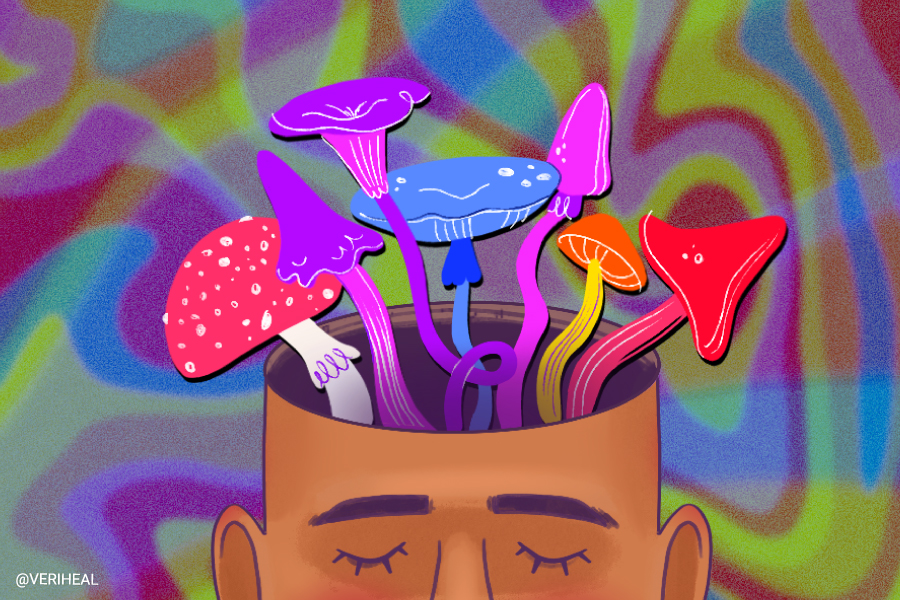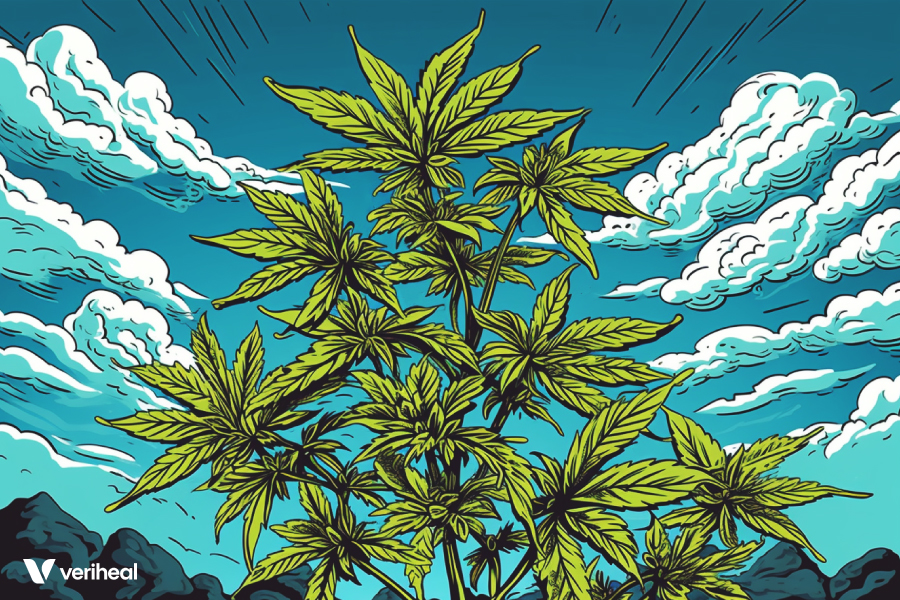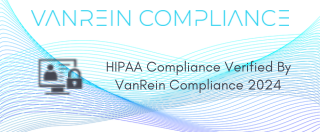Personality Disorders and Medical Cannabis Treatment
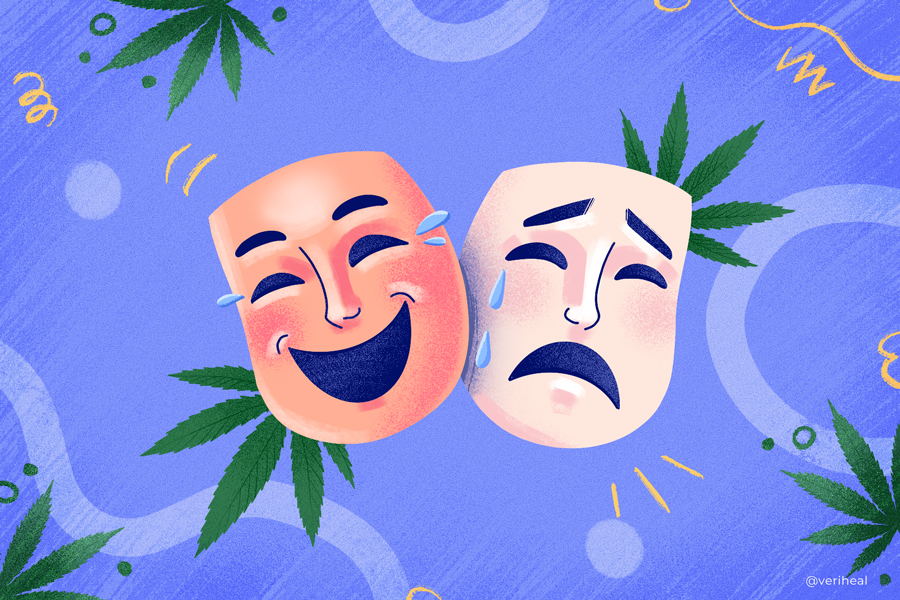
Doctors may recommend medical cannabis for personality disorders.
Personality Disorders are characterized by thoughts, feelings, and behaviors that differ from cultural expectations and cause distress or problems functioning. These symptoms typically occur in a pattern that lasts over time.
Unique compounds within the cannabis plant interact directly with endocannabinoid receptors in the brain. When these receptors are activated, symptoms of personality disorders – such as aggression, irritability, depression, and anxiety – are sometimes lessened.
- The Role of Cannabinoids in Personality Disorders and Mental Health
- Medical Cannabis Recommendations for Personality Disorders
- What are Personality Disorders?
The Role of Cannabinoids in Personality Disorders and Mental Health
Cannabis contains compounds that interact directly with the mechanisms in the brain. These cannabinoids can dampen the effects of depression, anxiety, and other symptoms of personality disorders.
Medical cannabis contains over 120 different and naturally occurring medicinal compounds called cannabinoids. Each cannabinoid shares similar effects but can still have a distinct impact on the body, especially in varying concentrations.
Among the most studied cannabinoids in the cannabis plant are Δ9-tetrahydrocannabinol (THC) and cannabidiol (CBD). THC is known for its psychoactive effects, while CBD has pain-relieving and relaxing qualities.
When you ingest cannabis, the cannabinoids in the plant activate several receptors in the body. These receptors include cannabinoid receptors CB1 and CB2.
CB1 and CB2 are two of the entry points of the endocannabinoid system. Other receptors that respond to cannabinoids are now considered part of the greater endocannabinoidome (eCBome).
CB1 and CB2 receptors are located in the brain and other tissues in the body. When activated, they increase or decrease fat-based neurotransmitters called endocannabinoids that the body naturally produces.
This activation helps the body with various processes, such as the perception of chronic pain, reducing inflammation, and maintaining the proper body temperature. The other receptors in the eCBome, like serotonin, also supplement these healing pathways.
Aggression, irritability, depression, and anxiety are associated with several personality disorders. Cannabinoids such as CBD and small amounts of THC may combat these symptoms.
Research has shown that serotonin activity is enhanced when CBD increases the endocannabinoid anandamide (AEA). As a result, fear and stress are eased (12, 17).
When THC combines with CBD, CB1 receptors stimulate the release of a neurotransmitter called norepinephrine. This neurotransmitter reduces depression and anxiety by mimicking prescription serotonin and norepinephrine reuptake inhibitors (SNRIs).
Additionally, the neurotransmitters AEA and 2-arachidonoylglycerol (2-AG) play a role in the biological mechanisms of aggression (16). These neurotransmitters work with indirect cannabinoid modulators fatty acid amide hydrolase (FAAH) and monoacylglycerol lipase.
Research in many human trials shows that THC dampens aggression when taken in small doses.
Cannabinoids & Borderline Personality Disorder
Regarding medical cannabis treatment, borderline personality disorder (BPD) is the most extensively researched out of the ten types of personality disorders.
Research shows that BPD anger and agitation may be related to failed brain signaling between the amygdala (fear and aggression center) and the brain’s prefrontal cortex or judgment center (14).
In this case, the brain cannot regulate anandamide (AEA), resulting in dangerously low levels.
Medical professionals are researching the endocannabinoid system as a target for BPD. Fatty acid amide hydrolase FAAH is a specific research target because it is the enzyme that breaks endocannabinoids down.
Antisocial Personality Disorder & The Endocannabinoid System
Cannabis consumption can impact the symptoms of Antisocial Personality Disorder (ASPD).
A 2021 study examined the levels of FAAH in the brains of 16 ASPD patients who have previously committed violent crimes (15). Five of these patients also had schizophrenia. =The study excluded patients with a history of substance abuse in the last 12 months. The researchers compared CURB PET scans and MRI scan results from this group to 16 people who have no history of mental illness.
The participants with ASPD displayed lower levels of FAAH in all the areas examined compared to the control group (15). The ASPD group also had lower amygdala FAAH activity levels than the control group. The lower levels of FAAH and amygdala correlate to the ASPD patients who self-reported having higher impulsive behaviors.
The results supported the study’s initial hypothesis that ASPD patients have brain chemical differences that may be leading to aggressive behaviors and violent crimes (15). Scientists believe that future research may be able to address the aggression of ASPD patients, as FAAH plays a prominent role in how endocannabinoids activate the body.
Medical Cannabis for Personality Disorders
Certain compounds within the cannabis plant can ease the symptoms of several personality disorders. As such, doctors may recommend medical cannabis to treat these disorders.
Medical cannabis is available in several forms, such as raw flower, edibles, and oils. These offerings differ from state to state.
While much of the research about personality disorders connect deficiencies in the brain to the endocannabinoid system, researchers are still not able to give clinical guidance on using medical cannabis for personality disorders at this time. More research is needed to understand these disorders.
As such, providers should use their clinical judgment and exercise caution in these populations. Medical professionals must also prepare to manage comorbid conditions and possible psychiatric emergencies like worsening mania or suicidal ideation.
Despite a lot of research in this area, not all the research is necessarily considered positive.
Some studies show positive results from CBD alone and CBD combined with small amounts of THC for mental health issues (25). However, much research shows that cannabis contributes to depression along with borderline and schizotypal traits (24).
A 2019 study looking at twins regarding personality disorders and cannabis use showed that personality disorders such as ASPD and BPD actually might put patients at higher genetic risk for cannabis use disorder (8). This study evaluated 2801 twins, including all ten personality disorder types. Providers should be aware of this potentially elevated risk, as substance use disorders, including cannabis use disorder, are more commonly comorbid with mental health conditions than the general population.
Using Synthetic Cannabis for Personality Disorders
While there are many synthetic cannabis products available (e.g., spice, K2, synthetic marijuana), they are often less effective than medical cannabis.
The synthetic chemicals in these products do not contain CBD or cannabivarin (CBV). CBD and CBV interact with THC in natural cannabis via the entourage effect, providing both anti-psychotic and anti-anxiety impacts (16).
These synthetic cannabis products also do not undergo the same regulations as medical marijuana bought from dispensaries. This lack of regulation makes it difficult to know the exact dosage of these products. Synthetic cannabis products are generally considered toxic and should be avoided by everyone, especially those with mental health conditions (30).
Synthetic cannabis may produce severe side effects that natural cannabis does not.
Many people taking synthetic cannabinoids experience side effects like agitation, anxiety, irritability, hallucinations, cognitive impairment, and psychosis (16). Researchers do not yet know the long-term effects of synthetics, but research indicates a history of extreme mental distress related to synthetic cannabis use.
Therefore, doctors do not recommend synthetic cannabis for patients with a history of mental illness.
As per the short-term effects, the CDC warns, “The health effects of synthetic cannabinoids can be unpredictable and harmful–even life-threatening. Anyone who experiences a serious reaction to synthetic cannabinoids should call 911 or go to the emergency department immediately”(30).
What Are Personality Disorders?
A person with a personality disorder typically exhibits an enduring pattern of behaviors, perceptions, reactions, tendencies, judgment, insight, and thought processes that deviate from cultural expectations and cause distress or problems functioning.
Patients who have these disorders differ in the way that they think as well as how they relate to and perceive other people (20). These patients experience the same feelings as people who do not have personality disorders, but these feelings are much more intense and may interfere with their daily lives.
Personality disorders are usually diagnosed in patients who are older teenagers or young adults (35). These patients may experience symptoms that resolve with time or lessen as they age. Many patients with schizotypal or obsessive-compulsive disorders do not share these changes concerning their age.
Personality disorders can be treated with cognitive behavioral therapy as well as medications. Sadly, personality disorders are among the most difficult to treat in psychiatry, and there still aren’t any approved medications for these conditions (48). These individuals may also experience other mental health conditions, such as anxiety and depression.
Personality Disorder Symptoms
The symptoms of personality disorders vary depending on an individual’s condition. These disorders are typically underdiagnosed. When patients get help for personality disorders, it is often for symptoms of anxiety, depression, psychosis, or mania. According to the Diagnostic and Statistical Manual of Mental Disorders (DSM-5), patients must exhibit the following guidelines to be diagnosed with a personality disorder (35):
- Experience 2 or more persistent, inflexible, or pervasive patterns of maladaptive traits in the areas of cognition, affectivity, interpersonal functioning, and impulse control.
- These traits cause significant stress or impaired functioning.
- Patterns have been relatively stable since early onset, meaning they trace back to adolescence or early adulthood.
Personality Disorder Types
Ten different personality disorders are diagnosable in the DSM-5 (35). This manual contains the typical symptoms and characteristics of each disorder.
The DSM-5 organizes these disorders into the groupings listed below.
Cluster A
Individuals diagnosed with these disorders may exhibit odd or eccentric behaviors (49). Patients with these disorders may have difficulty relating to others and display abnormal behavior (21).
- Paranoid personality disorder (PPD) (44)
- Schizoid personality disorder (ScPD) (46)*
- Schizotypal personality disorder (STPD) (47)*
*ScPD and STPD are separate disorders from schizophrenia. These patients do not experience the hallucinations and psychosis common in schizophrenia.
Cluster B
This group consists of disorders with emotional or erratic symptoms (35). Patients in this group may struggle to relate to others (21).
- Antisocial personality disorder (ASPD) (36)
- Borderline personality disorder (BPD) (38)
- Histrionic personality disorder (HPD) (39)
- Narcissistic personality disorder (NPD) (41)
Cluster C
Generally, patients with the following disorders may display anxious, or fearful behavior (49). They may appear anxious or fearful, withdraw, and show reluctance to socialize (37).
- Avoidant personality disorder (AVPD) (37)
- Dependant personality disorder (DPD) (39)
- Obsessive-compulsive personality disorder (OCPD) (45)
Note: Veriheal does not intend to give this as professional medical advice. Do not attempt to self-diagnose or prescribe treatment based on the information provided on this page. Always consult a physician before making any decision on the treatment of a medical condition.
1. Bonaccorso, S., Ricciardi, A., Zangani, C., Chiappini, S., & Schifano, F. (2019). Cannabidiol (CBD) use in psychiatric disorders: A systematic review. NeuroToxicology, 74, 282–298. https://www.sciencedirect.com/science/article/abs/pii/S0161813X19300774
2. Chabrol, H., Ducongé, E., Casas, C., Roura, C., & Carey, K. B. (2005). Relations between cannabis use and dependence, motives for cannabis use, and anxious, depressive, and borderline symptomatology. Addictive Behaviors, 30(4), 829–840. https://www.sciencedirect.com/science/article/abs/pii/S0306460304003053
3. Chabrol, H., Chauchard, E., Goutaudier, N., & van Leeuwen, N. (2012). Exploratory study of the Psychopathological Profiles of Adolescent Cannabis Users. Addictive Behaviors, 37(10), 1109–1113. https://www.sciencedirect.com/science/article/abs/pii/S0306460312001931
4. Chaudhury, S., Sudarsanan, S., Salujha, S. K., & Srivastava, K. (2005). Cannabis Use in Psychiatrie Patients. Medical journal, Armed Forces India, 61(2), 117–120. https://www.ncbi.nlm.nih.gov/pmc/articles/PMC4922960/
5. Courtney, D., Hammond, C. J., Rizwan, B., Giasson, S., & Gupta, M. (2022). The Cannabis Ask: What’s a Psychiatrist to Do?. Journal of the Canadian Academy of Child and Adolescent Psychiatry = Journal de l’Academie canadienne de psychiatrie de l’enfant et de l’adolescent, 31(1), 28–37.https://www.ncbi.nlm.nih.gov/pmc/articles/PMC8862599/
6. Distel, M. A., Trull, T. J., de Moor, M. M., Vink, J. M., Geels, L. M., van Beek, J. H., Bartels, M., Willemsen, G., Thiery, E., Derom, C. A., Neale, M. C., & Boomsma, D. I. (2012). Borderline personality traits and substance use: genetic factors underlie the association with smoking and ever use of cannabis, but not with high alcohol consumption. Journal of personality disorders, 26(6), 867–879. https://www.ncbi.nlm.nih.gov/pmc/articles/PMC3744119/
7. Donald, F., Arunogiri, S., & Lubman, D. I. (2019). Substance use and borderline personality disorder: Fostering hope in the face of complexity. Australasian Psychiatry, 27(6), 569–572. https://journals.sagepub.com/doi/abs/10.1177/1039856219875061?journalCode=apya
8. Ferber, S. G., Hazani, R., Shoval, G., & Weller, A. (2021). Targeting the Endocannabinoid System in Borderline Personality Disorder: Corticolimbic and Hypothalamic Perspectives. Current neuropharmacology, 19(3), 360–371. https://www.ncbi.nlm.nih.gov/pmc/articles/PMC8033970/
9. Gillespie, N. A., Aggen, S. H., Neale, M. C., Knudsen, G. P., Krueger, R. F., South, S. C., Czajkowski, N., Nesvåg, R., Ystrom, E., Kendler, K. S., & Reichborn-Kjennerud, T. (2018). Associations between personality disorders and cannabis use and cannabis use disorder: a population-based twin study. Addiction (Abingdon, England), 113(8), 1488–1498. https://www.ncbi.nlm.nih.gov/pmc/articles/PMC6043378/
10. Ho, W., & Kolla, N. J. (2022). The endocannabinoid system in borderline personality disorder and antisocial personality disorder: A scoping review. Behavioral Sciences & the Law, 40(2), 331–350. https://onlinelibrary.wiley.com/doi/abs/10.1002/bsl.2576
11. Kayser, R. R., Haney, M., Raskin, M., Arout, C., & Simpson, H. B. (2020). Acute effects of cannabinoids on symptoms of obsessive-compulsive disorder: A human laboratory study. Depression and anxiety, 37(8), 801–811. https://www.ncbi.nlm.nih.gov/pmc/articles/PMC7423713/
12. Kevorkian, S., Bonn-Miller, M. O., Belendiuk, K., Carney, D. M., Roberson-Nay, R., & Berenz, E. C. (2015). Associations among trauma, posttraumatic stress disorder, cannabis use, and cannabis use disorder in a nationally representative epidemiologic sample. Psychology of Addictive Behaviors, 29(3), 633–638. https://psycnet.apa.org/record/2015-43528-003
13. Johnson, B., MS,RDN. (2020, Spring). Calming Anxiety with Cannabis. CRx Magazine. Retrieved December 29, 20, from https://www.crxmag.com/issues/2020/spring/calming-anxiety-with-cannabis.shtml#
14. Kristalyn Salters-Pedneault, P. D. (2023, February 13). What are personality disorders in the DSM-5? Verywell Mind. Retrieved February 28, 2023, from https://www.verywellmind.com/personality-disorders-a2-425427
15. Kolla, N.J., Mizrahi, R., Karas, K. et al. Elevated fatty acid amide hydrolase in the prefrontal cortex of borderline personality disorder: a [11C]CURB positron emission tomography study. Neuropsychopharmacol. 45, 1834–1841 (2020). https://www.nature.com/articles/s41386-020-0731-y
16. Kolla, N.J., Boileau, I., Karas, K. et al. Lower amygdala fatty acid amide hydrolase in violent offenders with antisocial personality disorder: an [11C]CURB positron emission tomography study. Transl Psychiatry 11, 57 (2021). https://www.nature.com/articles/s41398-020-01144-2
17. Kolla, N. J., & Mishra, A. (2018). The Endocannabinoid System, Aggression, and the Violence of Synthetic Cannabinoid Use, Borderline Personality Disorder, Antisocial Personality Disorder, and Other Psychiatric Disorders. Frontiers in behavioral neuroscience, 12, 41. https://www.ncbi.nlm.nih.gov/pmc/articles/PMC5880947/
18. Masataka, N. (2019). Anxiolytic effects of repeated cannabidiol treatment in teenagers with social anxiety disorders. Frontiers in Psychology, 10. https://www.frontiersin.org/articles/10.3389/fpsyg.2019.02466/full
19. MediLexicon International. (n.d.). Personality disorder: What are the different types? Medical News Today. Retrieved February 28, 2023, from https://www.medicalnewstoday.com/articles/192888#schizotypal_personality_disorder
20. Personality disorder. Mental Health America. (n.d.). Retrieved February 28, 2023, from https://www.mhanational.org/conditions/personality-disorder
21. Personality disorder. NHS inform. (n.d.). Retrieved February 28, 2023, from https://www.nhsinform.scot/illnesses-and-conditions/mental-health/personality-disorder
22. Personality disorder. NHS inform. (n.d.). Retrieved February 28, 2023, from https://www.nhsinform.scot/illnesses-and-conditions/mental-health/personality-disorder#signs-and-symptoms-of-personality-disorders
23. Quinn, C. A., Wilson, H., Cockshaw, W., Barkus, E., & Hides, L. (2017). Development and validation of the cannabis experiences questionnaire – intoxication effects checklist (CEQ-I) short form. Schizophrenia Research, 189, 91–96. https://www.sciencedirect.com/science/article/abs/pii/S0920996417300695
24. Ranger, L. (2022, August 24). Antisocial and borderline personality disorders associated with cannabis use. Psychiatry Advisor. Retrieved February 28, 2023, from https://www.psychiatryadvisor.com/home/topics/addiction/antisocial-and-borderline-personality-disorders-associated-with-cannabis-use/
25. Raynal, P., & Chabrol, H. (2016). Association between schizotypal and borderline personality disorder traits, and cannabis use in young adults. Addictive Behaviors, 60, 144–147. https://www.sciencedirect.com/science/article/abs/pii/S0306460316301678
26. Sarris, J., Sinclair, J., Karamacoska, D. et al. Medicinal cannabis for psychiatric disorders: a clinically-focused systematic review. BMC Psychiatry 20, 24 (2020). https://bmcpsychiatry.biomedcentral.com/articles/10.1186/s12888-019-2409-8
27. Shalit, N., Rehm, J., & Lev-Ran, S. (2019). The association between Cannabis use and psychiatric comorbidity in people with personality disorders: A population-based longitudinal study. Psychiatry Research, 278, 70–77. https://www.sciencedirect.com/science/article/abs/pii/S0165178119308662
28. Sherman, B. J., McRae-Clark, A. L., Baker, N. L., Sonne, S. C., Killeen, T. K., Cloud, K., & Gray, K. M. (2017). Gender differences among treatment-seeking adults with cannabis use disorder: Clinical profiles of women and men enrolled in the achieving cannabis cessation-evaluating N-acetylcysteine treatment (ACCENT) study. The American journal on addictions, 26(2), 136–144. https://www.ncbi.nlm.nih.gov/pmc/articles/PMC5323358/
29. Sultan, W., Mathew, A., Brown, M. R., Gálvez-Flórez, J. F., & Moreno-Sanz, G. (2022). Cannabis-based medicinal products in the management of emotionally unstable personality disorder (EUPD): A narrative review and case series. Brain Sciences, 12(11), 1467. https://www.mdpi.com/2076-3425/12/11/1467
30. Synthetic cannabinoids: What are they? What are their effects? | HSB | NCEH. (2022, April 11). https://www.cdc.gov/nceh/hsb/chemicals/sc/default.html
31. U.S. Department of Health and Human Services. (n.d.). Personality disorders. National Institute of Mental Health. Retrieved February 28, 2023, from https://www.nimh.nih.gov/health/statistics/personality-disorders
32. U.S. National Library of Medicine. (n.d.). Personality disorders. MedlinePlus. Retrieved February 28, 2023, from https://medlineplus.gov/personalitydisorders.html
33. Vaziri-harami, R., Sefidgar, S., Vaziri-harami, S., & Samani, N. (2022). Borderline personality disorder among cannabis users and its association with demographic variables. Psiquiatría Biológica, 29(2), 100366. https://www.sciencedirect.com/science/article/abs/pii/S1134593422000161
34. Wenk, G. (2020, September 18). Chocolate, cannabis, and borderline personality disorder. Psychology Today. Retrieved February 28, 2023, from https://www.psychologytoday.com/us/blog/your-brain-food/202009/chocolate-cannabis-and-borderline-personality-disorder
35. Zimmerman, M. (2023, February 14). Overview of personality disorders – psychiatric disorders. Merck Manuals Professional Edition. Retrieved February 28, 2023, from https://www.merckmanuals.com/professional/psychiatric-disorders/personality-disorders/overview-of-personality-disorders
36. Zimmerman, M. (2023, February 14). Antisocial personality disorder (ASPD) – psychiatric disorders. Merck Manuals Professional Edition. Retrieved February 28, 2023, from https://www.merckmanuals.com/professional/psychiatric-disorders/personality-disorders/antisocial-personality-disorder-aspd
37. Zimmerman, M. (2023, February 14). Avoidant personality disorder (AVPD) – psychiatric disorders. Merck Manuals Professional Edition. Retrieved February 28, 2023, from https://www.merckmanuals.com/professional/psychiatric-disorders/personality-disorders/avoidant-personality-disorder-avpd
38. Zimmerman, M. (2023, February 14). Borderline personality disorder (BPD) – psychiatric disorders. Merck Manuals Professional Edition. Retrieved February 28, 2023, from https://www.merckmanuals.com/professional/psychiatric-disorders/personality-disorders/borderline-personality-disorder-bpd
39. Zimmerman, M. (2022, September). Dependant Personality Disorder (DPD) – psychiatric disorders. Merck Manuals Professional Edition. Retrieved February 28, 2023, from https://www.merckmanuals.com/professional/psychiatric-disorders/personality-disorders/dependent-personality-disorder-dpd
40. Zimmerman, M. (2022, September). Histrionic Personality Disorder (HPD) – psychiatric disorders. Merck Manuals Professional Edition. Retrieved February 28, 2023, from https://www.merckmanuals.com/professional/psychiatric-disorders/personality-disorders/histrionic-personality-disorder-hpd
41. Zimmerman, M. (2023, February 14). Narcissistic personality disorder (NPD) – psychiatric disorders. Merck Manuals Professional Edition. Retrieved February 28, 2023, from https://www.merckmanuals.com/professional/psychiatric-disorders/personality-disorders/narcissistic-personality-disorder-npd
42. Zimmerman, M. (2023, February 14). Paranoid personality disorder (PPD) – psychiatric disorders. Merck Manuals Professional Edition. Retrieved February 28, 2023, from https://www.merckmanuals.com/professional/psychiatric-disorders/personality-disorders/paranoid-personality-disorder-ppd
43. Zimmerman, M. (2023, February 14). Obsessive-compulsive personality disorder (OCPD) – psychiatric disorders. Merck Manuals Professional Edition. Retrieved February 28, 2023, from https://www.merckmanuals.com/professional/psychiatric-disorders/personality-disorders/obsessive-compulsive-personality-disorder-ocpd
44. Zimmerman, M. (2023, February 14). Schizoid personality disorder (SCPD) – psychiatric disorders. Merck Manuals Professional Edition. Retrieved February 28, 2023, from https://www.merckmanuals.com/professional/psychiatric-disorders/personality-disorders/schizoid-personality-disorder-scpd
45. Zimmerman, M. (2023, February 14). Schizotypal personality disorder (STPD) – psychiatric disorders. Merck Manuals Professional Edition. Retrieved February 28, 2023, from https://www.merckmanuals.com/professional/psychiatric-disorders/personality-disorders/schizotypal-personality-disorder-stpd
46. Fariba, K., Gupta, V., & Kass, E. (2022). Personality Disorder. StatPearls. https://www.statpearls.com/articlelibrary/viewarticle/27052/
47. Personality Disorder. (n.d.). Mental Health America. Retrieved March 18, 2023, from https://mhanational.org/conditions/personality-disorder




